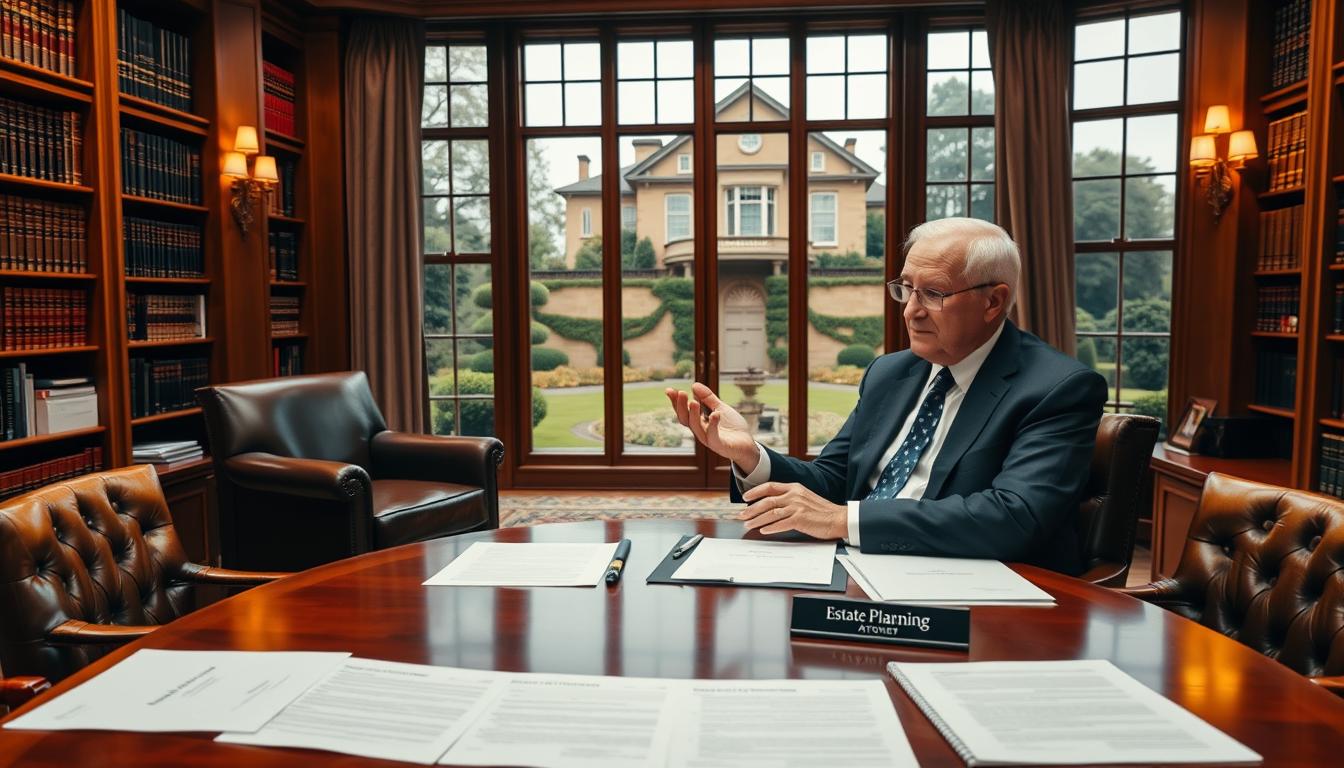Planning for the future is a crucial step in securing your legacy and ensuring your loved ones are protected. Estate planning is more than just drafting a will; it involves creating a comprehensive strategy for your assets, properties, and financial security. A well-structured estate plan can help minimise inheritance tax liability, potentially saving beneficiaries significant amounts in taxes1.
Legal advice from a qualified solicitor ensures your end-of-life wishes are honoured and your estate is managed according to your specifications. Without proper planning, your family may face lengthy court procedures and legal complications after your passing. Approximately 60% of individuals do not have a will or estate plan in place, highlighting the importance of seeking professional guidance1.
Starting an estate plan early safeguards against potential legal issues and ensures your assets are distributed as you intend. Effective planning can also protect your assets from creditors, divorce settlements, or disputes, ensuring they remain intact and distributed according to your wishes1. Engaging a solicitor provides invaluable guidance, ensuring compliance with legal requirements and optimizing the estate plan’s effectiveness.
Estate planning is not just about wealth distribution; it’s about peace of mind. Knowing that your loved ones are cared for and your legacy preserved can bring significant comfort. Regular reviews and updates of your estate plan are essential, especially after significant life changes, to ensure alignment with current circumstances and goals1.
Introduction to Estate Planning and Legal Advice
Estate planning is a structured approach to managing your assets and ensuring their distribution according to your wishes after your passing. It involves creating legal documents such as wills, trusts, and power of attorney to organize your affairs effectively.
Legal advice is crucial in this process as it ensures that all documents are compliant with the law and accurately reflect your intentions. A solicitor can guide you through the complexities, helping you navigate potential challenges and avoiding legal pitfalls.
| Component | Purpose | Benefit |
|---|---|---|
| Will | Outlines asset distribution | Ensures assets are allocated as intended |
| Trust | Manages assets for beneficiaries | Provides tax efficiency and control |
| Power of Attorney | Grants authority to manage affairs | Ensures decisions are made in your best interest |
Starting early with legal support can prevent future complications, ensuring your wishes are honoured without unnecessary delays or disputes. For more information on how estate planning works, visit this resource2.
when should estate planning begin: recognising the right time
Timing plays a crucial role in ensuring that your estate plan is both effective and comprehensive. Many individuals postpone estate planning, but it is essential to start the process as soon as you begin accumulating assets and responsibilities3.
Key life milestones often signal the right time to initiate or review your estate plan. For instance, turning 18 marks legal adulthood, making it an ideal time to establish basic arrangements. Marriage, the birth of children, or purchasing property are also significant events that require attention to your estate plan3.
| Milestone | Significance |
|---|---|
| Legal Adulthood (18 years) | Establish basic estate planning documents |
| Marriage | Update wills and consider joint assets |
| Having Children | Ensure provisions for minors and guardianship |
| Property Purchase | Include new assets in your estate plan |
It’s important to review your estate plan regularly, especially after significant life changes. This ensures your wishes remain accurate and your family is well cared for. Recognising these milestones can prevent future complications and legal disputes3.
Understanding the Benefits of Legal Advice
Expert legal advice is indispensable for securing your future and protecting your family’s interests. A qualified solicitor ensures that your wishes are honoured and your assets are distributed as intended, avoiding lengthy court processes that can delay resolution and incur significant costs4.
How Expert Advice Secures Your Future
A reliable lawyer streamlines the estate planning process, reducing the risk of court involvement and ensuring compliance with legal requirements. Legal guidance is critical in designating a power of attorney and appointing guardians for children, which are essential for protecting their future4.
| Benefit | Details |
|---|---|
| Power of Attorney | Grants authority to manage your affairs if you become incapacitated |
| Guardianship | Ensures minors are cared for according to your wishes |
| Tax Efficiency | Minimises inheritance tax liability through proper planning |
Approximately 60% of individuals lack a proper estate plan, highlighting the importance of professional guidance4. Legal advice safeguards future financial security, prevents disputes, and ensures your legacy is preserved. For more information on estate planning, visit this resource4.
Life Milestones Triggering Estate Plan Updates
Life is full of significant events that can impact your estate plan. These milestones often signal the need to review and update your legal documents to ensure they remain relevant and effective.
Savings, Property Ownership and Financial Events
Financial changes, such as starting a savings account or purchasing property, can significantly alter your asset portfolio. These events often require updates to your estate plan to reflect your current financial situation and wishes5. Additionally, tax implications associated with new assets may necessitate a review of your legal documents to optimise your financial security.
Marriage, Children and Family Changes
Major life events like marriage, the birth of a child, or the loss of a loved one are critical triggers for updating your estate plan. Marriage, for instance, may lead to joint assets and new beneficiaries, while the birth of a child requires provisions for their care and inheritance6. Similarly, the death of a family member or inheritance can introduce new assets that need to be incorporated into your plan.
Regular updates, ideally every three to five years, ensure your estate plan aligns with your current life circumstances and goals6. Consulting with a legal professional can provide the necessary guidance to keep your plan up-to-date and effective.
The Essential Role of Wills and Trusts
Wills and trusts are fundamental components of a comprehensive estate plan, ensuring your assets are managed and distributed according to your wishes. A Will provides a clear, legally binding document that outlines how your estate should be divided, while trusts offer additional layers of control and protection.
Why Creating a Will is Crucial
A Will is essential for ensuring your wishes are legally recorded and executed. Without one, your assets may be distributed according to default laws, which can lead to family disputes and legal challenges7. A Will designates beneficiaries, appoints guardians for minors, and specifies how assets, including inheritances, should be managed. It also allows you to make specific bequests and outline funeral preferences, providing clarity and peace of mind for your loved ones.
Moreover, a Will can prevent lengthy court processes and potential conflicts among beneficiaries. It ensures that your estate is handled efficiently, reducing the risk of legal complications and delays in asset distribution7.
How Trusts Protect Your Legacy and Assets
Trusts are powerful tools that offer enhanced control over asset distribution. They allow you to place conditions on how and when beneficiaries receive their inheritances, providing an additional layer of protection. For instance, trusts can be used to manage inheritances for minors or protect assets from creditors7.
Trusts also help bypass probate, which can be a time-consuming and costly process. By placing assets in a trust, they are distributed directly to beneficiaries without court involvement, ensuring a smoother transition7. This can be particularly beneficial for families seeking to avoid delays and additional fees.
Regular updates to your Will and trusts are essential, especially after significant life changes such as marriage, divorce, or the birth of a child. Ensuring these documents reflect your current wishes and circumstances is crucial for maintaining their effectiveness7.
In conclusion, Wills and trusts form the cornerstone of a robust estate plan. They provide the necessary legal framework to protect your legacy, ensure your wishes are honoured, and offer peace of mind for you and your family.
Avoiding Probate and Securing Your Assets
Probate is a legal process that verifies a will and oversees the distribution of an estate. However, it can be a lengthy and costly process, often delaying the transfer of assets to beneficiaries. Avoiding probate is crucial to ensure your assets are secured and distributed according to your wishes.
Strategies to Bypass Lengthy Court Processes
One effective strategy is to create trusts, which allow assets to be transferred directly to beneficiaries without court involvement8. Trusts provide an additional layer of control and protection, ensuring your assets are managed as intended. Another approach is to legally reassign property ownership during your lifetime, minimizing the need for court interventions8.
Regular updates to your estate plan are essential to ensure these strategies remain effective. For instance, reviewing your will every five years or after significant life changes, such as marriage or the birth of a child, can prevent future complications8. Digital platforms now offer tools to streamline estate planning, making it easier to manage and update your documents efficiently.

A well-structured estate plan not only avoids probate but also ensures your legacy is preserved. By aligning your estate plan with legal strategies, you can secure your assets and provide peace of mind for your family. For more information on how to avoid probate, visit this resource8.
The Value of Professional Legal Guidance in Estate Planning
Professional legal guidance plays a pivotal role in ensuring that your estate plan is both comprehensive and compliant with current laws. A dedicated estate planning lawyer offers expertise that helps navigate the complexities of asset distribution, tax implications, and legal requirements, providing peace of mind for you and your family.
When and Why to Hire an Estate Planning Lawyer
There are several scenarios that indicate the need for professional legal advice. Complex situations, such as inheritance disputes or managing multi-property portfolios, often require bespoke legal guidance to ensure your wishes are honoured and your assets are protected. A lawyer can help you create a tailored estate plan that addresses your unique circumstances, ensuring compliance with legal standards and tax efficiency.
Regular reviews of your estate plan are essential to keep it current. Ideally, you should update your estate plan every year or after significant life changes, such as marriage, divorce, or the birth of a child. This ensures that your plan remains relevant and effective in reflecting your current situation and wishes.
A lawyer can offer peace of mind by handling complex investments and legal requirements. For instance, they can help you understand how trusts work and how they can be used to mitigate inheritance tax liabilities, potentially saving beneficiaries up to 20% in taxes. This level of expertise ensures that your legacy is preserved and your family is protected from unnecessary legal complications.
When selecting an estate planning attorney, look for qualifications such as experience in estate law and a track record of successful interventions. A reputable lawyer will guide you through the process, ensuring that your estate plan is robust and aligned with your goals. For example, studies show that approximately 60% of adults in the UK do not have a valid Will, which can lead to complications in asset distribution9.
Engaging a solicitor can reduce the likelihood of legal disputes by over 40%, ensuring that your wishes are clearly documented and understood9. This not only provides peace of mind but also ensures that your family avoids the financial and emotional burden of unresolved legal issues.
In conclusion, professional legal guidance is indispensable for securing your future and protecting your family’s interests. Regular reviews and updates to your estate plan, guided by a qualified lawyer, ensure that your wishes are honoured and your assets are managed according to your specifications.
Integrating Estate Planning into Your Financial Strategy
Aligning estate planning with your overall financial strategy is essential for protecting your assets and ensuring a smooth transfer of wealth. This integrated approach not only enhances asset protection but also optimises tax efficiency, ensuring your legacy is preserved for future generations.
Tax Implications and Investment Considerations
Estate planning plays a crucial role in minimising tax burdens. For instance, the federal estate tax exemption for 2023 is set at $12.92 million, meaning estates below this threshold avoid federal taxes10. Additionally, gifting assets during your lifetime can reduce the estate’s size, with the annual gift tax exclusion at $17,000 per recipient10. Strategic investment choices, such as placing assets in trusts, can further mitigate tax liabilities while maintaining control over distribution.
Periodic Reviews and Updates
Regular reviews of your estate plan are vital to accommodate life changes such as marriage, the arrival of children, or shifts in investment portfolios. Updating your documents ensures that your spouse and guardian arrangements remain valid and aligned with your current wishes. Ideally, reviews should occur every three to five years or after significant events11.
| Document Type | Financial Planning Element | Benefit |
|---|---|---|
| Will | Asset Distribution | Ensures assets are allocated as intended |
| Trust | Tax Efficiency | Reduces estate tax liability |
| Power of Attorney | Investment Management | Grants authority to manage affairs |
Integrating estate planning with financial strategy ensures a cohesive approach to wealth management. For more insights, visit this resource12.
“A well-integrated estate plan is the cornerstone of a secure financial future, protecting your family and preserving your legacy.”
Key Considerations:
- Ensure your spouse and guardian arrangements are updated regularly.
- Consider tax implications when transferring assets.
- Review your estate plan after significant life events.
Maintaining current documentation is crucial for ensuring your wishes are honoured and your family is protected. Regular updates and a strategic approach to tax optimisation will provide peace of mind and financial security.
Conclusion
Securing your legacy and protecting your loved ones is one of the most important decisions you can make. Estate planning is a critical affair that ensures your wishes are honoured and your assets are taken care of with precision. As highlighted earlier, approximately 60% of individuals do not have a proper estate plan in place, which can lead to legal complications and financial burdens for their families13.
Starting early and updating your plan regularly is essential. Life changes, such as marriage, the birth of children, or significant financial shifts, often require adjustments to your estate plan. Professional legal guidance can prevent complications and ensure every aspect of the process is taken care of. A well-documented plan safeguards your assets and provides peace of mind for your loved ones.
Considering legal advice as part of your financial strategy is crucial. It helps mitigate inheritance taxes and ensures your legacy is preserved. If you haven’t already, take the time to review your current estate plan or consult an expert to ensure everything is in order. Your family’s future depends on it.
FAQ
What is estate planning and why is it important?
Estate planning is the process of arranging how your assets, property, and wishes will be managed and distributed after your death or if you become incapacitated. It is crucial for ensuring your loved ones are cared for, your wishes are honoured, and your estate is protected from unnecessary taxes or court interventions.
Do I need a lawyer to create an estate plan?
While it is possible to draft basic documents on your own, a qualified lawyer specialising in estate planning can provide expert advice tailored to your specific situation. They can help ensure your documents are legally binding and reflect your wishes accurately, especially in complex cases involving trusts or multiple beneficiaries.
How often should I update my estate plan?
It is advisable to review and update your estate plan every few years or after significant life events, such as marriage, divorce, the birth of a child, or a change in financial circumstances. Regular updates ensure your plan remains relevant and aligns with your current wishes and situation.
What is the difference between a Will and a Trust?
A Will outlines how your assets will be distributed after your death and names an executor to carry out your wishes. A Trust, on the other hand, allows you to transfer ownership of assets to a separate entity, managed by a trustee, often to avoid probate and provide tax benefits. Both are essential components of a comprehensive estate plan.
Can I avoid probate through estate planning?
Yes, certain estate planning strategies, such as creating a Trust or designating beneficiaries for specific assets, can help bypass the probate process. Probate can be lengthy and costly, so many individuals choose to plan their estates to ensure their loved ones avoid this process.
How do taxes impact estate planning?
Taxes, including inheritance tax, can significantly affect how your estate is distributed. A well-structured estate plan, often with the help of a legal expert, can minimise tax liabilities and ensure more of your assets go to your intended beneficiaries rather than being lost to taxes.
What is a Power of Attorney and why is it important?
A Power of Attorney grants a trusted person the authority to make decisions on your behalf regarding financial or healthcare matters if you become unable to do so. It is an essential part of estate planning, ensuring your affairs are managed according to your wishes even if you lose capacity.
How do I choose the right person to be my executor or trustee?
The executor or trustee should be someone you trust implicitly, with the capacity to manage your estate responsibly. They could be a family member, close friend, or even a professional. It is important to discuss your wishes with them and ensure they are willing and able to take on the role.
Can I make changes to my estate plan after it is finalised?
Yes, you can make changes to your estate plan at any time, provided you have the mental capacity to do so. It is important to keep your plan updated to reflect any changes in your personal circumstances, financial situation, or wishes.
What happens if I die without an estate plan?
If you die without an estate plan, your assets will be distributed according to the laws of intestacy, which may not align with your wishes. This can lead to lengthy court processes, higher taxes, and potential disputes among your loved ones. Having a plan in place ensures your estate is managed according to your intentions.
How do I ensure my children are protected in my estate plan?
You can name a guardian for your children in your Will and set up trusts to manage their inheritance until they reach a specified age. This ensures their financial and personal well-being are protected, even if you are no longer able to care for them.
What role does a beneficiary play in estate planning?
A beneficiary is the person or persons you designate to receive specific assets or portions of your estate. You can name beneficiaries in your Will, life insurance policies, or retirement accounts, ensuring your loved ones receive the gifts you intend for them.
How does marriage or divorce affect my estate plan?
Marriage or divorce can significantly impact your estate plan, as it may change your beneficiaries, asset ownership, and legal rights. It is crucial to update your plan after such events to reflect your current wishes and legal status.
Can I include charitable donations in my estate plan?
Yes, you can include charitable donations in your estate plan. Many people choose to leave a portion of their estate to charitable organisations, which can also provide tax benefits. A lawyer can help you structure these donations to align with your financial and philanthropic goals.
How do I know if my estate plan is comprehensive?
A comprehensive estate plan should include a Will, Powers of Attorney, beneficiary designations, and possibly Trusts. It should also address tax implications, guardianship for dependents, and strategies to avoid probate. Consulting with an estate planning lawyer can help ensure your plan covers all necessary aspects.
What is the process of starting estate planning?
Starting estate planning involves assessing your assets, identifying your goals, and consulting with a legal expert to draft the necessary documents. It is a personal and important process that requires careful thought and professional guidance to ensure your wishes are honoured.
Source Links
- https://mjrsolicitors.co.uk/will-trust-estate-planning/
- https://www.nerdwallet.com/article/investing/estate-planning/estate-planning
- https://firstbusiness.bank/resource-center/estate-planning-for-every-life-stage/
- https://www.investopedia.com/articles/wealth-management/122915/4-reasons-estate-planning-so-important.asp
- https://wealth-counselors.com/blog/incorporating-life-milestones-into-your-estate-plan/
- https://trustandwill.com/learn/when-to-start-estate-planning?srsltid=AfmBOorLgWsZFSo21rQXHuQbDnqXErUTnlX0sSwx6BJPsAgx8gL9SLn2
- https://bluenotary.us/trusts-wills/
- https://www.bdwm.co.uk/estate-planning-basics-a-beginners-guide-to-protecting-your-legacy/
- https://www.richardnelsonllp.co.uk/guides/estate-planning-advice-and-checklist-secure-your-legacy/
- https://www.harnesswealth.com/articles/estate-planning/
- https://paxfinancialgroup.com/financial-planning/should-you-combine-estate-and-financial-planning/
- https://www.morganstanley.com/articles/estate-planning-checklist
- https://www.jpmorgan.com/insights/wealth-planning/trusts-and-estates/we-need-to-talk-communicating-your-estate-plan-with-your-family

















